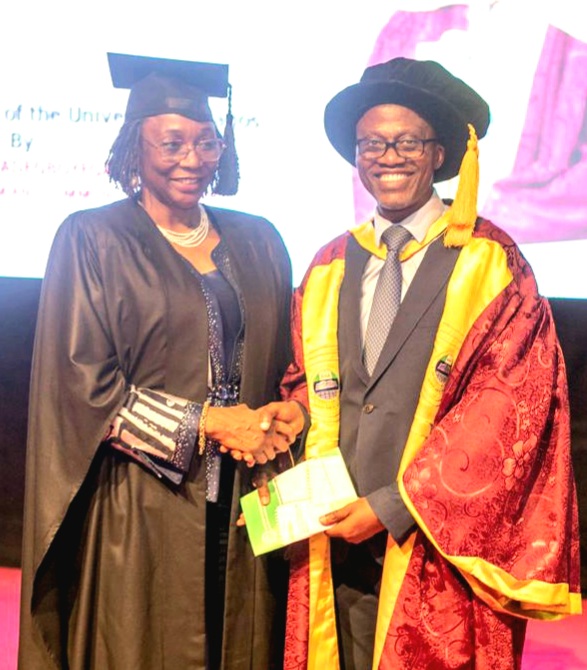A Professor of Journalism and Communication Studies at the University of Lagos (UNILAG) Akoka, Ismail Adegboyega Ibraheem, has stressed the need for Nigeria to overhaul its media industry to enable practitioners and their media organizations to always adhere to the rules and regulations guiding the industry.
The scholar expressed this concern as the inaugural lecturer at the university’s fifth inaugural lecture in the 2024/2025 academic session, held on Wednesday, on campus.
Worried by the unethical practices of many Nigerian journalists and media houses, throwing away integrity and allowing news sensationalism, the ‘killing’ of stories, and what he called “casino journalism” in place of investigative journalism, the lecturer emphasized the urgent need for a change of narrative.
Prof. Ibraheem is the director of International Relations, Partnerships, and Prospect at UNILAG and the first alumnus of the university’s Department of Mass Communication to deliver an inaugural lecture as a lecturer in the department in its 58-year history.
He spoke on “Casino Journalism and the End of History,” describing the term as a style of media reporting in which sensationalism, entertainment, and the display of reportage overshadow thorough investigation and factual accuracy, especially on serious issues of public concern.
According to him, journalism practice in Nigeria has tended towards a game in which the media stakes its credibility for high ratings, clicks, advertising revenues, and personal gains instead of pursuing the truth that will uplift society.
He noted that the media in any society is expected to shape public discourse, influence societal attitudes, hold government accountable, and also frame historical narratives that will add substantial value to society.
ALSO READ: Tinubu’s economic reforms to manifest in 2025 – Minister
But in Nigeria, Ibraheem pointed out, “casino” journalism and practices are increasingly endemic, as most journalists now deprive the public of important value addition, instead creating a scenario where the 24-hour news cycle produces all forms of unnecessary tensions, including political, religious, and ethnic strife, while the economic struggles also make the industry a fertile ground for shallow and sensational reportage.
According to him, stories about political corruption, social crises, and celebrity gossip, for example, are often embellished in Nigeria to capture the public’s attention, manifesting in various forms, including clickbait, the commercialization of news, hostage journalism, blackmail tactics, and the sale of prime-time slots to the highest bidders.
He added that in some cases, deliberate adversarial journalism (an act to favor one group over another) is also used to create leverage in negotiations, while other outlets suffer from the serial non-payment of salaries to their workers or excessive influence from their media owners.
Pointing out that the media industry is supposed to play a consequential role by following the principles of good journalism and remaining alive to its responsibility as the fourth estate of the realm, Ibraheem noted that unfortunately, most journalists and media houses prefer sensationalizing their news reportage.
“They also lack the ability to substantiate their stories with facts, which is why they often fail to stay on stories until a logical conclusion is achieved, as is expected of good journalism,” he added.
Making references, Ibraheem cited several reported cases of high-profile corruption in the country, including the “Abacha Loot,” “Dasuki Arms Scandal,” “NNPC Unremitted Funds,” “Halliburton Scandal,” “National Assembly Budget Padding Scandal,” and the “NDDC Scandal,” among others.
He said that enough reportage on the real issues surrounding these cases has not come to the fore since their inception.
What most journalists do in this regard, he noted, is report only the surface of the issues in question, sensationalize them, and fail to address the implications of such actions on the populace and society at large, as well as how to effectively prevent their recurrence.
Ibraheem added that to worsen the situation, most journalists habitually rely on leaks and public statements from politicians, without verifying the evidence to substantiate such information, which is often politically motivated.
He said, “That is why most times, reported cases of corruption or human rights violations, for example, in Nigeria more often than not end with no tangible result for society.”
The inaugural lecturer, therefore, advocated for proper funding of media organizations, adequate training, well-remunerated workers, and the provision of a support system to the industry as a whole, enabling it to perform its constitutional role as the watchdog of society.
He said this would be a veritable way to foster Nigeria’s democracy.
In her remarks at the event, the Vice-Chancellor of UNILAG, Prof. Folasade Ogunsola, extolled the virtues of the inaugural lecturer, describing him as a great scholar and researcher.
According to her, Prof. Ibraheem has contributed significantly to the development of the Mass Communication Department at UNILAG and the university as a whole.
The Vice-Chancellor pointed out that Ibraheem’s lecture painted a vivid picture of Nigeria’s media landscape, where most journalists prefer sensational news, disregarding ethical practices and the danger this poses to individual and public life.
According to the VC, sensational news and unethical practices erode serious public discourse, endanger historical contextualization, and undermine the collective understanding of societal challenges.
“That is why the inaugural lecturer’s critique reminds us that the media, when stripped of depth and context, risks serving the interests of the powerful rather than the public good.
Therefore, his call for the transformation of Nigeria’s media system is to uphold journalism that not only educates, informs, and elevates society, but also remains steadfast in truth, equity, and justice.
“That is how the media can help grow our democracy,” she concluded.
NIGERIAN TRIBUNE
